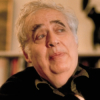Harold Bloom

Harold Bloom
Harold Bloomis an American literary critic and Sterling Professor of Humanities at Yale University. Since the publication of his first book in 1959, Bloom has written more than 20 books of literary criticism, several books discussing religion, and a novel. He has edited hundreds of anthologies concerning numerous literary and philosophical figures for the Chelsea House publishing firm. Bloom's books have been translated into more than 40 languages...
NationalityAmerican
ProfessionTeacher
Date of Birth11 July 1930
CountryUnited States of America
Harold Bloom quotes about
I saw the Oxford English Dictionary there for the first time.
I'm talking in the millions. I can't tell you one, two, three or 10. I'm just saying that it's in the millions.
I think that's not reading because there's nothing there to be read,
I realized early on that the academy and the literary world alike -- and I don't think there really is a distinction between the two -- are always dominated by fools, knaves, charlatans and bureaucrats. And that being the case, any human being, male or female, of whatever status, who has a voice of her or his own, is not going to be liked.
We read, frequently if not unknowingly, in search of a mind more original than our own.
Information is endlessly available to us; where shall wisdom be found?
Rebecca Mead's My Life in Middlemarch is a wise, humane, and delightful study of what some regard as the best novel in English. Mead has discovered an original and highly personal way to make herself an inhabitant both of the book and of George Eliot's imaginary city. Though I have read and taught the book these many years I find myself desiring to go back to it after reading Rebecca Mead's work.
All that a critic, as critic, can give poets is the deadly encouragement that never ceases to remind them of how heavy their inheritance is.
Reading well is one of the greatest pleasures that solitude can afford you.
Aesthetic value emanates from the struggle between texts: in the reader, in language, in the classroom, in arguments within a society. Aesthetic value rises out of memory, and so (as Nietzsche saw) out of pain, the pain of surrendering easier pleasures in favour of much more difficult ones ... successful literary works are achieved anxieties, not releases from anxieties.
I am not unique in my elegiac sadness at watching reading die, in the era that celebrates Stephen King and J.K. Rowling rather than Charles Dickens and Lewis Carroll.
... one doesn't want to read badly any more than live badly, since time will not relent. I don't know that we owe God or nature a death, but nature will collect anyway, and we certainly owe mediocrity nothing, whatever collectivity it purports to advance or at least represent.
Real reading is a lonely activity.
There is no method except yourself.